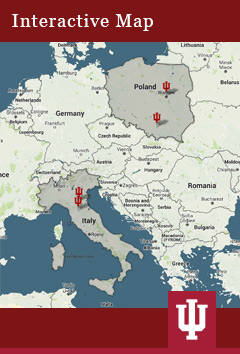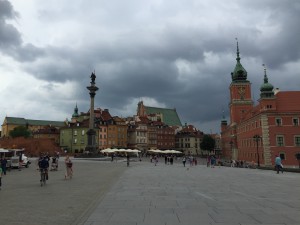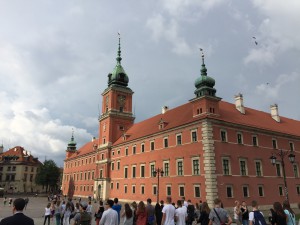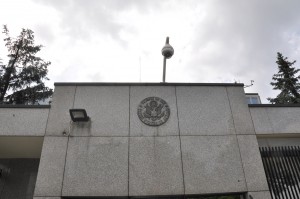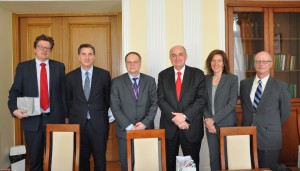Resilience and rejuvenation in Poland
Walking the streets of Warsaw, it’s impossible not to be inspired by the resilience of a city that, throughout its 700-year history, has endured an almost unthinkable amount of turbulence and tragedy.
Sadly, unlike Krakow to the southeast, Warsaw — Poland’s capital and largest city — retains next to none of its original buildings, due to the horrible events of World War II. After the German invasion of Poland in 1939, the Nazis forced the city’s entire Jewish population, which included around 400,000 thousand people, into what would be known as the Warsaw Ghetto. From there, at least 254,000 of the area residents were sent to a concentration camp over the course of just two months in summer of 1942.
Not long after creating the sealed-off area, in 1944, with the Russian Red Army nearing Warsaw, Adolf Hitler ordered the entire city to be razed to the ground, reducing Warsaw to a sea of rubble. The Nazi reign of terror resulted in the destruction of 85 percent of the city, including the historic “Old Town” and almost all of the city’s once-proud government edifices, castles, churches and monuments.
For more than four decades following the war, a communist regime, set up by the conquering Soviet Union, would rule Warsaw. During this time, the new government erected a number of buildings that reflected the monolithic and minimalist architectural style of the rest of the communist states of Central and Eastern Europe, also known as the Eastern or Soviet Bloc.
Ultimately — some might say miraculously — neither the Nazis nor the Soviet communists could contain the proud spirit of the Polish people of Warsaw, who over the last half century have meticulously reconstructed much of their old city. The city currently features many prominent buildings that reflect a variety of architectural styles. The so-called Stalinist empire style, or “socialist classicism,” still permeates large parts of Warsaw, but it is complemented by some magnificent architecture, a combination of modern and old world, that reflects a remarkably cosmopolitan city. Indeed, a five-year construction campaign resulted in the successful restoration — in the Baroque and Renaissance style — of the marketplace, churches, palaces and town homes of Krakow’s Old Town, which has once again assumed its proper place as the heart of the city.
Today’s Warsaw reflects the rebirth and rejuvenation of Poland, which has literally risen from the ashes to become one of 21st century Europe’s most vitally important countries.
Poland’s ascent in stature is clearly testament to the extraordinary determination and will of the Polish people, who have helped lead the nation to a most interesting crossroads. Indeed, today’s Poland finds itself in a prominent leadership position within the European community, and the country is suddenly being challenged to ensure that the positive results of its dramatic transformation are felt more nationally, including in its most remote villages and small towns. Furthermore, the country is now being pushed to share its extraordinary “Polish experience” — one of unique economic and democratic success — with the other countries of Central and Eastern Europe.
Expanding educational opportunity
On Tuesday morning, members of the IU delegation met in downtown Warsaw with the leaders of the Polish-American Freedom Foundation, including its president and CEO Jerzy Kozminski, former Polish ambassador to the U.S. Last year, the foundation celebrated 15 years of working to strengthen Poland’s civil society, democracy and market economy, in large part by equalizing and expanding opportunities for educational and social development.
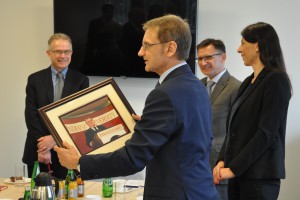
Polish-American Freedom Foundation President and CEO Jerzy Kozminski receives a framed picture of when former Polish President Lech Walesa visited IU.
Since its founding, the Polish-American Freedom Foundation has launched a number of successful initiatives focused on education and community development in rural areas and small towns in Poland. They include, among other programs, training and grant competitions aimed at improving the quality of English-language teaching; new “bridge” scholarships for talented high-school graduates; opportunities for student volunteerism; leadership and skill-development training; support systems for Polish NGOs and civic initiatives; and civic and legal counseling.
Looking beyond Poland, the foundation has established a scholarship program for young leaders from across Eastern Europe, as well as from South and Central Asia, to perform their post-graduate studies at Polish universities and participate in internships in Polish companies. The foundation is also engaged in establishing grants, training opportunities and study tours that help illustrate the realities of Poland’s growth and major role within the European Union to foreign students and scholars.
Today’s more than two-hour meeting revealed several areas in which IU and the Polish-American Freedom Foundation might potentially collaborate, as IU pursues a global strategy centered on, as neatly outlined today by IU President Michael A. McRobbie, raising IU students’ knowledge and understanding of other cultures through expanded overseas study opportunities; diversifying IU’s campuses through the addition of more international students, especially those from countries with less of a tradition of sending students to the U.S.; building collaborative relationships between IU faculty and their peers in top institutions around the world; and furthering IU’s longstanding tradition of academic and government institution-building.
Former U.S. Ambassador to Poland Lee Feinstein, the founding dean of IU’s School of Global and International Studies, and IU Vice President for International Affairs David Zaret both spoke openly about how proud IU has been of its historic relationship with Poland, which dates back 40 years and the formative role IU played in the creation of the American Studies Center at the University of Warsaw. (IU will participate in a special 40th anniversary celebration at the University of Warsaw on Wednesday afternoon.) Feinstein and Zaret also illuminated the university’s strengths in leadership training, public management and administration, area studies, foreign language instruction, business, law and other academic fields seemingly well aligned with the Polish-American Freedom Foundation’s priorities here in Poland.
Additionally, Hannah Buxbaum and Andrea Adam Moore, academic and gateway directors, respectively, of the new IU Europe Gateway office in Berlin, shared how the new office, which opened last fall, will support activities and initiatives for IU faculty to deepen ties with key institutional partners in Poland and across Europe.
The meeting concluded on a symbolic note of sorts — with McRobbie presenting Kozminski with a framed picture of former Polish President Lech Walesa taken in 1998, when the renowned solidarity hero and Nobel Peace Prize recipient made a celebrated visit to IU Bloomington, just one of the many chapters in IU’s storied history with this great country.
A commitment to the future
From the Polish-American Freedom Foundation, the delegation made a stop at former Ambassador Feinstein’s old stomping grounds here in Warsaw to meet at the U.S. Embassy with current U.S. Ambassador to Poland Paul W. Jones.
The meeting with Ambassador Jones, who assumed his post in Poland in September, offered delegation members another opportunity to highlight IU’s historic engagement in Poland and enthusiasm for re-energizing its partnerships here. IU took the first step in that process Monday when it renewed its cooperative agreement with Jagiellonian University in Krakow, one of the world’s oldest and most highly respected universities.
For his part, Jones was gracious in reminiscing about shared embassy experiences and challenges with his predecessor, while simultaneously offering several interesting insights into the state of higher education here in Poland. Indeed, it was especially generous of the ambassador to host the Hoosier delegation today, considering the major events coming up on the embassy’s horizon — in early July, his office will play a central role in organizing the historic Warsaw Summit, a meeting of all of the heads of state of NATO at Warsaw’s 58,000-seat National Stadium.
In particular, when it comes to Poland, IU has considerable interest in adjusting its focus toward issues concerning areas important to modern Poland and its future development.
“As proud as we are in our past relationship with Poland, we don’t want to rest on the past. We are really interested in moving our collaborations forward,” Feinstein told professor Leszek Sirko during the delegation’s final meeting late Tuesday afternoon. Sirko serves as Poland’s under-secretary of state in the Ministry of Science and Higher Education, and he is currently championing an effort to expand Poland’s research profile, in part by exploring possible collaborative activities with the best and most international research universities around the world. He was especially attracted to IU, which, he said, had managed the rare feat of partnering with Polish universities when such Cold War collaborations were the exception, not the norm, and he complemented IU for seeking to further its connections to Poland at a critical time in the country’s history.
(Coincidentally, and further proving that IU truly is everywhere, one of Sirko’s colleagues who attended today’s meeting had his own personal connection to IU. While pursuing his Ph.D. several years ago, Tomasz Kollat, chief expert of the Ministry’s Department of International Cooperation, spent time in Bloomington conducting research at the Department of Central Eurasian Studies.)
As the conversation continued, Sirko also became increasingly intrigued by IU’s new Grand Challenges research program to address complex, large-scale problems facing society and the university’s recent successes in advancing STEM education, two areas in which he is extremely passionate.
Finally, Henryka Bochniarz, one of Poland’s most prominent business leaders and feminists, joined the delegation for a working dinner to discuss trends in higher education and related issues. Among those also attending the dinner were a former minister of higher education and member of the European Parliament, the dean of Kozminski University, an internationally ranked private university in Warsaw, and other senior leaders in education and the private sector.
Interestingly, but not at all surprisingly, a singular theme surfaced at each of the IU delegation’s meetings today: Poland is extremely passionate about internationalizing its educational programs, and it sees in IU a strong and successful partner firmly committed to this dynamic country’s bright future.
Tags: Andrea Adam Moore, David Zaret, Hannah Buxbaum, IU Europe Gateway, IU Maurer School of Law, IU School of Global and International Studies, Jerzy Kozminski, Lee A. Feinstein, Leszek Sirko, Michael A. McRobbie, PAFF, Paul W. Jones, Poland, Polish-American Freedom Foundation, Tomasz Kollat, U.S. Ambassador, University of Warsaw, Warsaw, Warsaw architecture

